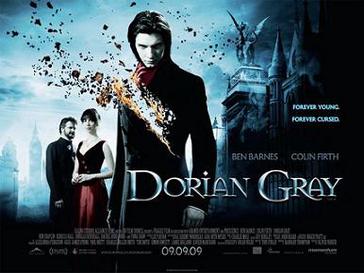"Forever Young. Forever Cursed."
So says the tag-line of this horrific yet enchanting version of Oscar Wilde's only published novel The Picture of Dorian Gray. Oliver Parker did such a wonderful job directing the film that I must include it in my list of better film adaptations of written works.
I myself have only read the abridged version of the novel, and thus missed out on what must have been the author's more lurid descriptions of the life of debauchery Mr Gray (Ben Barnes) had plunged himself into. Hence, the film itself is rather shocking to watch for the conservative viewer. Viewer's discretion is heavily, heavily advised.
Ben Barnes of "Prince Caspian (2008)" fame certainly did a remarkable job of appearing so unaffected by the acts and sins he committed himself to. While this may to some extent attract the scorn of critics, I think such acting is essential for depicting the Dorian Gray the author created. Certainly, such cynicism towards the brighter side of life, and the intense dedication to hedonism, makes Barnes' character a powerful anti-hero, one that viewers, I imagine, must love to hate and hate to love.
Colin Firth is, well, quite comfortable in his role as Dorian Gray's acquaintance, Lord Henry Wotton. Dear Harry mentored Dorian, preaching to him what he dared not practice, effectively transforming the mild-mannered, handsome young country boy into the cruel, sadistic bastard many still read about today. Firth manages to display, even from behind a stately beard, Wotton's emotional transformation from the devilish pride of a mentor, to the growing concern for a friend, and ultimately to the great hatred towards the monster he created.
Rebecca Hall, while only a supporting character who made her appearance towards the climax of the film, played Wotton's daughter Emily to great effect. One could actually feel the effect she has Dorian and his emotions. I don't know whether this is what really happened in the original novel - I certainly doubt the ending is true to Wilde's classic - but she certainly made a big impact on the silver screen. It is a pity her role is reduced to emphasize Dorian Gray's conscience. (Seriously, there's only so much debauchery and beauty one can take from a character blessed, or cursed, with eternal youth.)
The photography of the film is commendable too. Close-ups of Dorian's sex scenes, while appearing so sensual, gives a third person's point of view (or immense disgust) towards acts of debauchery. It certainly made me baulk. That aside, scenes of improving technology, the dark sides of London, and war against Germans tell how time has passed. These guys have finally realised how to present time changes without sticking stuff at your face and exaggerating the ravages of time on everyone's face. (Well, everyone, except Dorian, of course.)
This is most certainly a cautionary tale, and has remained strictly that. Instead of emphasizing on the consequences of immortality, Parker did a good job of highlighting Dorian's horrifying lifestyle and how it affects his soul, as depicted on his painting. On that note, I like how the painting only made so few appearances in the entire film, so that instead of "the picture of", the film is simply about Dorian Gray as a hedonist. However, towards the end, I must admit it is some sort of a mess, as the movie rushed ahead in its attempt to pull back to the cause of Dorian's eternal youth.
However, post-climax, the viewer's focus shifts to Lord Henry, who, in a very simplistic manner that lasts only two scenes, is shown to be living with the consequences of having made Dorian into the way he was (Gray's dead by then). Before facing the slightly burned painting, now restored (or close to, I think) to its original magnificence, he is seen in an empty ballroom (his house, it must be), trying to get his daughter back, who estranged herself from him thinking he left Dorian to burn alive in his attic, where he stores the cursed picture. True or not, I think he must be feeling the pain of causing a young man, with a full life ahead of him, to barter his soul for the earthly pleasures of life. Certainly, Dorian listened to him instead of his other friend, the society artist Basil Hallward who painted Dorian Gray's picture, but it was Wotton's continued coaching that turned Dorian against Basil's concerned warnings.
All-in-all, a stunning, horrific, true-to-novel film by the seemingly conservative British.



1 comment:
Coincidentally, I saw this one on DVD last weekend, having put off watching it for some time thinking it would be some horrid adaptation. But it actually turned out to be better than I'd expected. I taught the book to high-school students for many years (never quite a fan of it myself) and thought that the director made some interesting changes to it. (Lord Henry's daughter, for example, is a whole new invention.) I liked Ben Chaplin as Basil, gullible and vulnerable.
Post a Comment